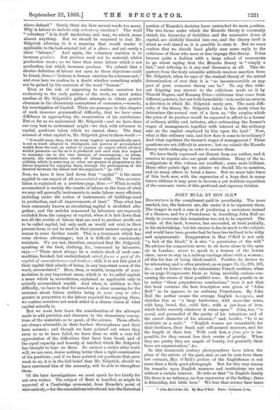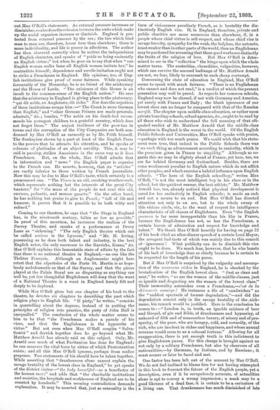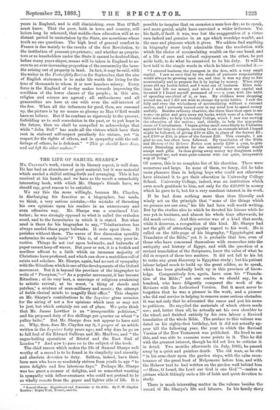JOHN BULL ET SON ILE.* DESCRIPTION is the compliment paid
to peculiarity. The more marked, too, the features are, the easier it is to represent them.
The danger in such a case is of producing a caricature instead of a likeness, and for a'Frenchman in describing John Bull en- tirely to overcome this temptation was not to be expected. The
writer of this book, however, has succeeded, at least partially, in his undertaking ; but his success is due in much to the subject, and would have been greater had he been less inclined to be witty and epigrammatic. Exaggeration in Max O'Rell is not only "a lust of the blood." it is also "a permission of the will." He advises his compatriots never to sit down alone in the open air in London; never to speak to a woman of the lowest class; never to stay in a railway-carriage alone with a woman ; all this for fear of being black-mailed. Further, he desires to be interesting, and is often prurient, as on pages 16, 35, 293, 307, &c.; and we believe that he calumniates French mothers, when he on page 33 represents them as being morbidly curious con- cerning the errors of their youthful sons. It were puerile in us to notice "these preposterous conclusions," were it not that this book contains the best description ever given of "John Bull" as he appears to an ordinary Frenchman. By John Bull the author means the average English bourgeois, and sketches him as "a large landowner, with muscular arms, with long, broad, flat, solid feet ; with a jaw-bone of iron, which holds securely whatever it seizes upon." John, too, "is moral, and persuaded of the parity of his intentions and of the sacred character of his mission ;" and, besides, "he is as obstinate as a mule." "English women are remarkable for their freshness, their frank and self-assured manners, and for the length of their feet. With such feet, a faux pas is im- possible, for they cannot lose their centre of gravity. When they are pretty they are angels of beauty, but generally their faces are expressionless," &c.
In this nineteenth century photographers have taken the place of the artists of the past, and, as can be seen from these few extracts, Max O'Rell's picture of the Englishman is not more than a fairly good photograph. But for this very reason, his remarks upon English manners and institutions are not without a certain interest. He tells us that " in English family life there is no intimacy, no free expression of the feeling; there is friendship, but little love." We fear that science here bears • John Bull ct Son lis. By Max O'Rell. Paris: Calmann Levy. out Max O'Rell's statements. As external pressure increases or diminishes, so also does the cohesion between the units which make up the social organism increase or diminish. England is pro- tected from external pressure by the sea ; the ties which bind man to man are, therefore, looser here than elsewhere; there is more individuality, and life is poorer in affections. The author has then observed correctly when he notices the independence of English character, and speaks of "pride as being eminently an English virtue ;" but when he goes on to say that when "one English woman walks lame all English women imitate her," he contradicts himself; dependence and servile imitation ought not to strike a Frenchman in England. His opinions, too, of Eng- lish institutions give proof of some fairness. While speaking favourably of the Monarchy, he is no friend of the aristocracy and the House of Lords. "The existence of this House is au insult to the common-sense of the English nation." He sees that the aristocracy in England is giving place to the plutocracy, "qui dit noble, en Angleterre, dit riche." Nor does the nepotism of these institutions escape him :—" The Court is more German than English," and "other German Princes are made generals, admirals," &c. ; besides, "The noble on his death-bed recom- mends his youngest children to a grateful country, which does not forget them." The unjust incidence of the poor-tax in towns and the corruption of the City Companies are both con- demned by Max O'Rell as earnestly as by Mr. Frith himself. The flunkeyism shown by a part at least of the English Press to the powers that be attracts his attention, and he speaks of columns of platitudes of an abject servility. This, it may be said in passing, strikes Americans in the same way as it does Frenchmen. But, on the whole, Max O'Rell admits that in information and " news " the English paper is superior to the French one. He asserts, however, that its " articles " are vastly inferior to those written by French journalists. Now this may be due to Max O'Rell's taste, which certainly is a pronounced one. "The Tinies is an old, creaking weather-cock, which represents nothing but the interests of the great City hankers," for "the mass of the people do not read. this old, envious, pedantic, and morose gazette?' On the other hand, he has nothing but praise to give to Punch; "full of life and humour, it proves that it is possible to be both witty and refined."
Coming to our theatres, he says that "the Stage in England has, in the nineteenth century, fallen as low as possible." In proof of this assertion, he instances the realism of the Surrey Theatre, and speaks of a performance at Drury Lane as "sickening." "The only English theatre which can be called serious is the Lyceum," and "Mr. H. Irving, possessing as he does both talent and industry, is the best English actor, the only successor to the Garricks, Keens," &c. Max O'Rell explains this lamentable state of affairs by the faCt that there is no national theatre in England,—no one like the Theatre Francais. Although an Anglomaniac might here retort that the re'pertoire of the Porte St. Martin is as hope- lessly melodramatic as that of the Surrey, and that the pieces played at the Palais Royal are as disgusting as anything can well be, yet few thoughtful Englishmen will deny that the want of a National Theatre is a want in England keenly felt and deeply to be deplored.
While Max O'Rell gives but one chapter of his book to the theatre, he devotes six chapters to describing the part which religion plays in English life. "If piety," he writes, "consists in quarrelling about the dogmas, instead of in putting the principles of religion into practice, the piety of John Bull is unequalled." The conclusion of the whole matter seems to him to be that "the Frenchman makes a parade of his vices, and that the Englishman is the hypocrite of virtue." But not even when Max O'Rell couples " Salva- tionist " and dervish together does he go beyond what Mr. Matthew Arnold has already said on this subject. Only, Mr. Arnold sees much of what Puritanism has done for England; he can measure the vital force by virtue of which Protestantism exists ; and all this Max O'Rell ignores, perhaps from malice prepense. Two statements of his should here be taken together. While asserting that "drunkenness alone cannot explain the savage brutality of the lowest class in England," he yet speaks of the district visitor—" the lady bountiful—us a benefactor of the human race ;" and adds that "the charitable institutions and societies, the hospitals and workhouses of England are to be counted by hundreds." This seeming contradiction demands explanation. It may be asserted that, just as sensuality is the form of viciousness peculiarly French, so is brutality the dis- tinctively English vice. If, in England, therefore, private and public charities are more numerous than elsewhere, if, in a people whose chief virtue is self-respect, and whose chief vice is savage ferocity, sympathy for the weak, the helpless, the outcasts, is not weaker than in other parts of the world, then an Englishman may be pardoned for assuming that these good works are distinctly the fruits of the religion of love. But Max O'Rell is deter- mined to see in the "collection" the hinge upon which the whole matter turns. The austerities, zbsurdities, vulgarities, however, which can survive the amused badinage of Mr. Matthew Arnold are not, we fear, likely to succumb to such cheap contempt.
Concerning the state of education in England, Max O'Rell seems to speak with much fairness. "There is no Englishman who cannot and does not read," is a verdict of which the present generation may well be proud. As regards her common schools, England may now be classed, if not with Germany and America, yet surely with France and Italy ; the blank ignorance of our lowest class can no longer be compared with that of the Russian monji/c. The chapter upon middle-class education, or rather upon private boarding-schools, school agencies, stc., ought to be read by all those who wish to understand the full meaning of that oft- quoted verdict of Mr. Matthew Arnold that the middle-class education in England is the worst in the world. Of the English Public Schools and Universities, Max O'Rell speaks with praise, —perhasis with too much praise. We could wish that his state- ment were true, that indeed in the Public Schools there was "no such thing as advancement according to seniority, which is the premium given in France to stupidity." Although as re- gards this we may be slightly ahead of France, yet here, too, we are far behind Germany and Switzerland. Besides, there are some weaknessei peculiar to English nature which do not afflict other peoples, and which exercise a baleful influence upon English schools. "The hero of the English schoolboy," writes Max O'Rell, "is not the most intelligent boy in his class or in the school, but the quickest runner, the best athlete." Mr. Matthew Arnold has, too, already noticed that physical development is cared for too exclusively in English schools ; is made an ends and not a means to an end. But Max O'Rell has directed attention not only to an arc, but to the whole sweep of this vicious circle, viz., to the want of respect for intelligence characteristic of all classes of Englishmen. Even "the English parvenu is far more insupportable than his like in France, because the Englishman has not, as has the Frenchman, a certain leaven of admiration and respect for knowledge and talent." We thank Max O'Rell heartily for having on page 72 of his book cited an after-dinner speech of a certain Lord Mayor, the arrogant bad-taste of which was mainly due to this conceit of— ignorance ! What publicity can do to diminish this vice ought to be done. We much fear, however, that he who boasts of his lack of knowledge does so chiefly because he is certain to be respected for the length of his purse.
But if Max O'Rell is surprised by the vulgarity and assump- tion of the nonvean.v riches in England, he is shocked by the brutalisation of the English lowest class. "Just as clean and. neat," he writes, "as are the women of the middle-classes, just so ignoble and disgusting are the women of the lowest class." Their immorality astonishes even a Frenchman,—c'est de la chiennerie sauvage! He instances a file of " sandwiches " as the "saddest spectacle of human degradation,"—and did the degradation consist only in the savage brutality of the .nick- name, his remark would be justified. Here is the conclusion he comes to :—" London is, in truth, an ignoble mixture of beer and Gospel, of gin and Bible, of drunkenness and hypocrisy, of unheard-of filth and of measureless luxury, of misery and of pro- sperity, of the poor, who are hungry, cold, and cowardly, of the rich, who are insolent in riches and happiness, and whose annual revenue would seem to us a colossal fortune." Allowing for all exaggeration, there is yet enough truth in this indictment to give Englishmen pause. For this charge is brought against us not only by a solitary Frenchman, but also by observers of all nationalities,—by Germans, by Italians, and by Russians; it must sooner or later be faced and met.
One factor has been left out of the account by Max O'Rell. We do not feel inclined to blame him for not having attempted in this book to forecast the future of the English people, yet a description, even if it be scrupulously accurate, of actualities alone is apt to convey a wrong impression ; a mask may be a good likeness of a dead face, it is certain to be a caricature of a living one. That drunkenness has much diminished of late years in England, and is still diminishing, even Max O'Rell must know. That the poor, both in town and country, will before long be rehoused, that middle-class education will at no distant period be undertaken by the State, are assertions whose truth no one questions. The high level of general comfort in France is due mainly to the results of the first Revolution, to the institution of peasant-prcprietors ; and whether as proprie- tors or as leaseholders under the State it cannot be doubted that, before many years elapse, means will be taken in England to as- sure to an ever-increasing proportion of the community the bene- fits arising out of property in land. In fact, it may be said, with the writer in the Fortnightly Review for September, that the aim of English statesmen is to make life worth the living for the tens of thousands to whom it is now hopeless misery. Every force in the England of to-day makes towards improving the condition of the lower classes of the people ; in this aim, religion and science are agreed ; all enthusiasms and all generosities are here at one with even the self-interest of the few. When all the influences for good, then, are summed up, the picture is by no means so gloomy as Max O'Rell would have us believe. But if he confines us rigorously to the present, forbidding us to seek consolation in the past, or to put hope in the future, then we shall be compelled to acknowledge that while "John Bull" has made all the virtues which have their root in stalwart self-respect peculiarly his virtues, yet "in respect for the rights of others, and in sympathy with the suf- ferings of others, he is deficient." "This ye should have done, and not left the other undone."




































 Previous page
Previous page